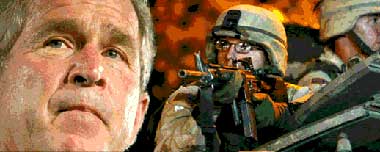|
|
|
That awful Vietnam comparison
( 2003-11-06 16:20) (Economist.com)
This week's bold assaults on American forces,
including mortars fired at coalition headquarters in Baghdad, are sending
shudders through Americans back home. Could Iraq become President George Bush¡¯s
political Achilles heel?
"I'M TIRED of waking up in the middle of the night worrying about the war."
So Lyndon Johnson reportedly told a friend during the Vietnam quagmire, which
forced him to decline running for a second term as president. Few Americans
think things are nearly so dire for President George Bush, six months into the
occupation of Iraq. There have been no flag-burning mass protests; the number of
soldiers killed is in the hundreds, not tens of thousands; and Iraq is not a
chaotic jungle but a (sort of) stable country. Still, Mr Bush may not be
sleeping as soundly as he would like. As more American soldiers lose their lives
to shadowy militants half a world away, impatience on the home front is growing.
 | Last weekend's
shooting down of an American helicopter, which killed 16 soldiers on their way
home for leave, marked the start of another painful week. On Tuesday November
4th, three mortars hit America's Baghdad occupation headquarters, which is deep
in the high-security ¡°green zone¡±. Four people were injured. And few Americans
will have forgotten that missiles fired last month at the Rashid hotel in
Baghdad narrowly missed America¡¯s visiting deputy defence secretary, Paul
Wolfowitz. After the latest violence, Spain (an American ally) has ordered most
of its diplomatic staff out of Iraq. Other organisations, like the United
Nations and the International Red Cross, have also sent most of their foreign
staff home.
Clearly, the militants are getting bolder and using heavier weapons. Two
months ago, the attacks mostly consisted of gunfire, car bombs or ¡°improvised
explosive devices¡± set along roads to trip up passing coalition vehicles. Most
attacks are still of this kind, but the increasing use of long-range weapons,
such as mortars and missiles, creates a headache for American commanders. They
even pose a danger to Americans barricaded behind high-security fences: they are
hard to guard against, except by means of intelligence (which is not the core
strength of the Americans, few of whom speak Arabic).
Mr Bush¡¯s administration has not changed its message in response to the new
attacks. The more Americans (and Iraqi helpers) die, the more America emphasises
that it is determined to succeed. ¡°We're being tested, and America and our
allies will not fail,¡± Mr Bush declared in his weekly radio address. Most
Sundays, top advisers, such as Donald Rumsfeld, the defence secretary, or
national security adviser Condoleezza Rice, take to the talk shows to pound home
the same message.
But Americans are becoming more sceptical. A Washington Post/ABC poll,
released this week, found that fewer than 15% of Americans think Iraq is the
most important bit of the war on terror¡ªa seeming repudiation of Mr Bush's
argument that the country is a ¡°central front¡± against terrorists. The cost of
war is one worry. Congress recently approved $87.5 billion in extra spending for
Iraq and Afghanistan (but mostly for Iraq); this money will increase America's
already huge deficit. Families of American soldiers who return in body-bags are
usually patriotic, but some are beginning to wonder why none of Saddam Hussein's
chemical and biological arsenal has been found. "Nobody can find the weapons,"
the father of one soldier killed in the helicopter attack told a local news
programme.
Ah, the weapons. In the run-up to the 2004 presidential elections, this issue
may yet become thorny for Mr Bush. America went to war ostensibly to rid Saddam
of his weapons of mass destruction. None has yet turned up, despite searches by
hundreds of soldiers and trained inspectors. Congressional committees are
investigating the quality of pre-war intelligence. In the Senate, Democrats on
the intelligence committee are reportedly seeking an independent inquiry that
would examine how the White House used intelligence (in other words, whether Mr
Bush and his advisers exaggerated). Mr Bush has so far weathered evidence that
he overstated Saddam¡¯s efforts to obtain uranium and the links between the Iraqi
regime and the September 11th attacks, but voters may ask harder questions as
election day approaches.
To be sure, Mr Bush's political footing is otherwise fairly sound. The
economy is zipping along; its 7.2% third-quarter growth rate has flustered
Democrats who had hoped to criticise the president¡¯s economic stewardship. Mr
Bush's popularity ratings, while slipping, are still well above 50%. True, many
Americans believe their country is headed in the wrong direction, but the lack
of coherence among Mr Bush¡¯s political opponents should give him consolation.
This is especially true of Iraq: Democrats are still divided about whether going
to war was a good idea or a bad one. They have been quick to denounce Mr Bush¡¯s
handling of the occupation but slow to suggest viable alternatives, aside from
training and arming more Iraqis, which the administration is already doing as
quickly as possible. (Paul Bremer, America¡¯s administrator in Iraq, has recently
come around to the idea of creating an Iraqi paramilitary force, according to
the Washington Post.)
So Iraq is still far from Vietnam, both as a military venture and as a
political concern. But unless the militants are somehow rooted out, it will
become a sleep-depriving issue for Mr Bush on the campaign trail next year.
|
|
|
| |
Go to Another
Section |
|
| |
|
|
| |
|
| |
|
|
| |
Article Tools |
|
| |
|
|
| |
|
|
| |
|
|
|
|
|
|
 |


